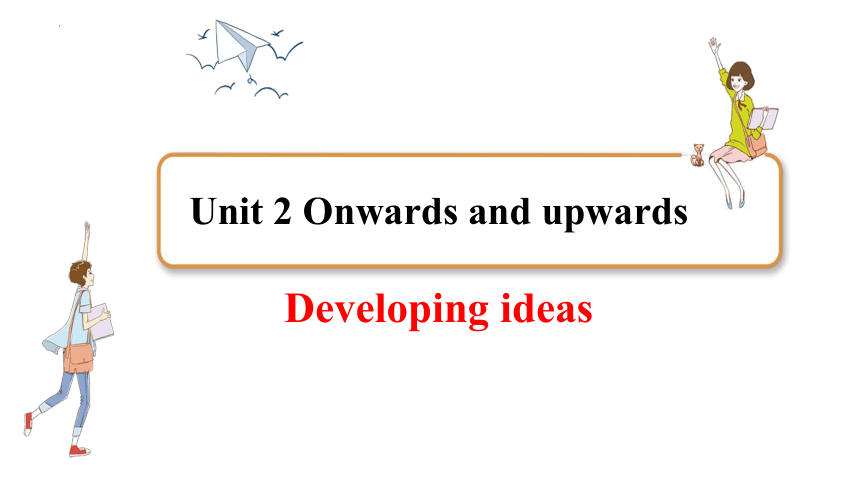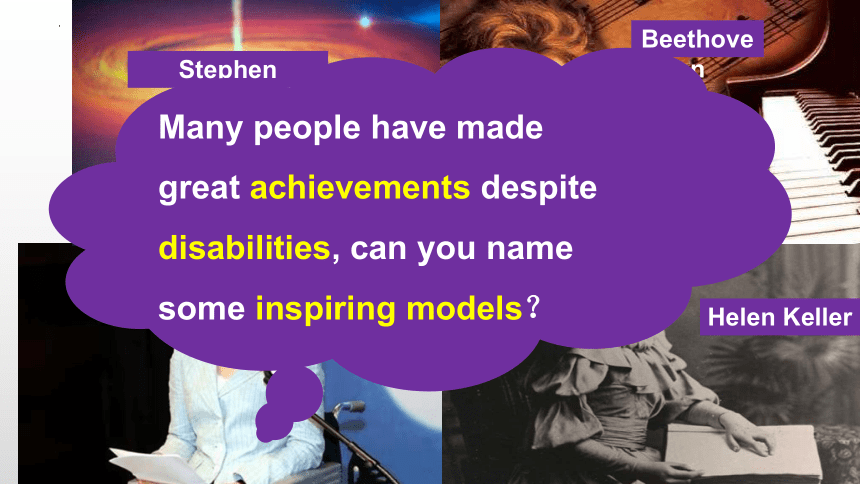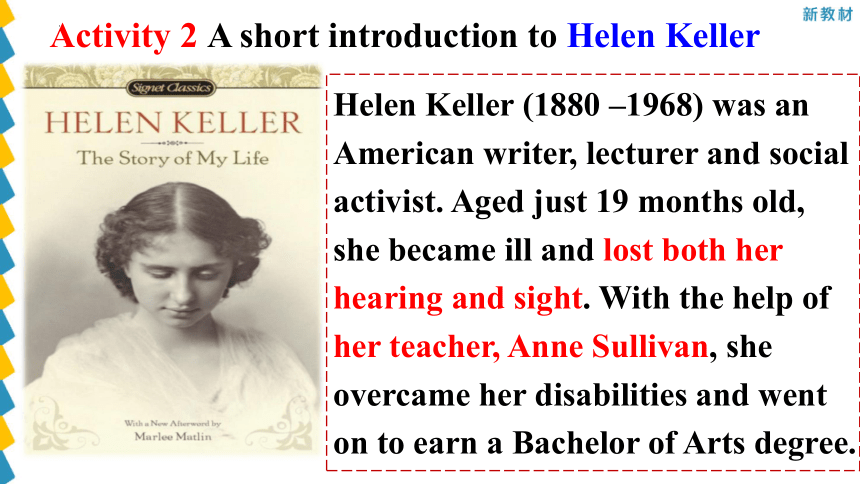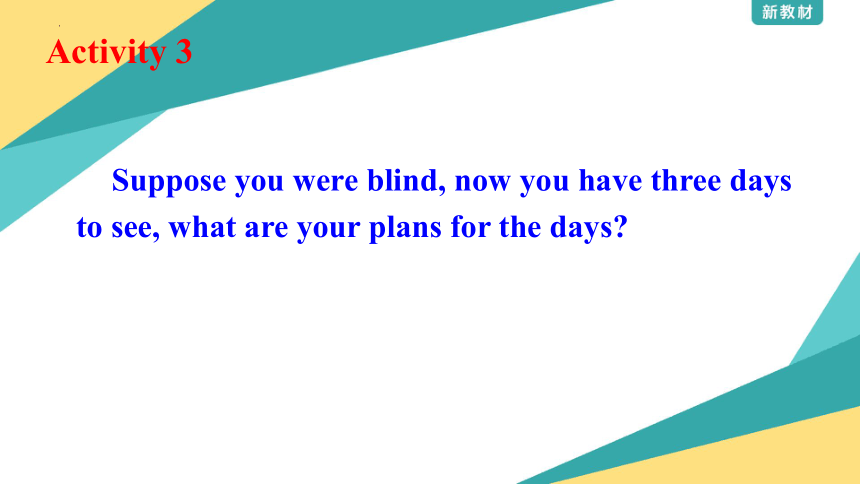外研版(2019) 选择性必修第一册 Unit 2 Onwards and Upwards Period 5 Developing ideas课件(18张ppt)
文档属性
| 名称 | 外研版(2019) 选择性必修第一册 Unit 2 Onwards and Upwards Period 5 Developing ideas课件(18张ppt) |  | |
| 格式 | pptx | ||
| 文件大小 | 39.0MB | ||
| 资源类型 | 教案 | ||
| 版本资源 | 外研版(2019) | ||
| 科目 | 英语 | ||
| 更新时间 | 2022-10-18 22:39:45 | ||
图片预览







文档简介
(共18张PPT)
Unit 2 Onwards and upwards
Developing ideas
Activity 1 Look at the charts and
answer the questions.
1. Are the numbers different
from what you expected
In what way
2. What special assistance can
people with disabilities make
use of in their daily lives
Special assistance
People with limited mobility problems could use
People who have reduced vision could use
wheelchairs,
walking sticks,
handrails…
special
pavements for the blind,
braille (布莱叶盲文) signs...
Stephen Hawking
Helen Keller
Beethoven
Zhang Haidi
Many people have made great achievements despite disabilities, can you name some inspiring models?
Activity 2 A short introduction to Helen Keller
Helen Keller (1880 –1968) was an American writer, lecturer and social activist. Aged just 19 months old, she became ill and lost both her hearing and sight. With the help of her teacher, Anne Sullivan, she overcame her disabilities and went on to earn a Bachelor of Arts degree.
Suppose you were blind, now you have three days to see, what are your plans for the days
Activity 3
Three Days to See
Read the passage and find out what the author would do if she could see.
Activity 4
On the first day
On the second day
On the third day
To see the people having helped her and accompanied her;
To see the books which have opened her mind;
To take a long walk in the woods and appreciate the beauty of nature.
To see a display of the progress of civilization;
To go to the museums and spend the evening at a theater or at the movies.
To greet the dawn again, anxious to discover new delights, new revelations of beauty.
To spend the third day observing people in their day-to-day life.
How did Hellen feel when her friend told her she had observed nothing in particular in the woods
Disappointed B. Appreciative C. Doubtful D. Approved
How was it possible, I asked myself, to walk for an hour through the woods and see nothing worthy of note I who cannot see find hundreds of things to interest me through mere touch. If I can get so much pleasure from touch, how much more beauty must be revealed by sight And I have imagined what I should most like to see if I were given the use of my eyes, say for just three days.
I who am blind can give one hint to those who see: Use your eyes as if tomorrow you would be stricken blind. And the same method can be applied to the other senses. Hear the music of voices, the song of a bird, the mighty strains of an orchestra, as if you would be stricken deaf tomorrow. Touch each object you want to touch as if tomorrow your tactile sense would fail. Smell the perfume of flowers, taste with relish each morsel, as if tomorrow you could never smell and taste again. But of all the senses, I am sure that sight must be the most delightful.
(Excerpts from "Three Days to See" by Helen Keller)
Use/Hear/Touch/Smell…,as if…
What sentence structure is used repeatedly
Parallelism(排比) as a literary device(文学修辞) is the use of expressions, clauses or sentences that are similar in their structure. It can make the content more rhythmic(有节奏的), engaging(有趣的) and easier to remember. It is commonly used in literary works and speeches.
Choose the author’s purpose in writing the passage and give your reasons.
1. To help readers understand what it is like to be blind.
2.To make readers without disabilities appreciate what they have.
3. To persuade readers to care about the blind.
√
Activity 5
2. What qualities can we learn from both reading passages in this unit
Facing difficulties and setbacks in life with a positive attitude.
1. What are the main wishes of the author Give an example.
The author would like to be able to see for three days. She would like to be able to see the people who have helped her and with whom she spends her time. She would like to see the books she has read.
Finish the exercises in part2 in 《自主》.
Unit 2 Onwards and upwards
Developing ideas
Activity 1 Look at the charts and
answer the questions.
1. Are the numbers different
from what you expected
In what way
2. What special assistance can
people with disabilities make
use of in their daily lives
Special assistance
People with limited mobility problems could use
People who have reduced vision could use
wheelchairs,
walking sticks,
handrails…
special
pavements for the blind,
braille (布莱叶盲文) signs...
Stephen Hawking
Helen Keller
Beethoven
Zhang Haidi
Many people have made great achievements despite disabilities, can you name some inspiring models?
Activity 2 A short introduction to Helen Keller
Helen Keller (1880 –1968) was an American writer, lecturer and social activist. Aged just 19 months old, she became ill and lost both her hearing and sight. With the help of her teacher, Anne Sullivan, she overcame her disabilities and went on to earn a Bachelor of Arts degree.
Suppose you were blind, now you have three days to see, what are your plans for the days
Activity 3
Three Days to See
Read the passage and find out what the author would do if she could see.
Activity 4
On the first day
On the second day
On the third day
To see the people having helped her and accompanied her;
To see the books which have opened her mind;
To take a long walk in the woods and appreciate the beauty of nature.
To see a display of the progress of civilization;
To go to the museums and spend the evening at a theater or at the movies.
To greet the dawn again, anxious to discover new delights, new revelations of beauty.
To spend the third day observing people in their day-to-day life.
How did Hellen feel when her friend told her she had observed nothing in particular in the woods
Disappointed B. Appreciative C. Doubtful D. Approved
How was it possible, I asked myself, to walk for an hour through the woods and see nothing worthy of note I who cannot see find hundreds of things to interest me through mere touch. If I can get so much pleasure from touch, how much more beauty must be revealed by sight And I have imagined what I should most like to see if I were given the use of my eyes, say for just three days.
I who am blind can give one hint to those who see: Use your eyes as if tomorrow you would be stricken blind. And the same method can be applied to the other senses. Hear the music of voices, the song of a bird, the mighty strains of an orchestra, as if you would be stricken deaf tomorrow. Touch each object you want to touch as if tomorrow your tactile sense would fail. Smell the perfume of flowers, taste with relish each morsel, as if tomorrow you could never smell and taste again. But of all the senses, I am sure that sight must be the most delightful.
(Excerpts from "Three Days to See" by Helen Keller)
Use/Hear/Touch/Smell…,as if…
What sentence structure is used repeatedly
Parallelism(排比) as a literary device(文学修辞) is the use of expressions, clauses or sentences that are similar in their structure. It can make the content more rhythmic(有节奏的), engaging(有趣的) and easier to remember. It is commonly used in literary works and speeches.
Choose the author’s purpose in writing the passage and give your reasons.
1. To help readers understand what it is like to be blind.
2.To make readers without disabilities appreciate what they have.
3. To persuade readers to care about the blind.
√
Activity 5
2. What qualities can we learn from both reading passages in this unit
Facing difficulties and setbacks in life with a positive attitude.
1. What are the main wishes of the author Give an example.
The author would like to be able to see for three days. She would like to be able to see the people who have helped her and with whom she spends her time. She would like to see the books she has read.
Finish the exercises in part2 in 《自主》.
